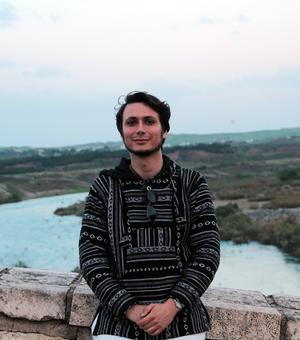Carlo Emilio Biuzzi
Please tell us about your research project.
I am currently pursuing a PhD in Religious Sciences and Byzantine History, entitled “The Church, the Desert, and the Mountains: The Social Organisation of Miaphysite Communities from the 6th Century to the Early Islamic Rule (8th Century)”. My project examines the development of the Miaphysite Church—also known as the Jacobite Church or Anti-Chalcedonian Movement—which gradually took shape after the Council of Chalcedon (451 CE) and the subsequent schism concerning the nature of Christ. In the northern Mesopotamian region, this schism led to the formation of a distinct ecclesiastical body that finds its heirs today in the Syriac Orthodox Church, primarily in the area of Tur Abdin (south-eastern Turkey) and within its modern diaspora, following the Assyrian–Syriac genocide (known as Sayfo) that occurred during the final phase of the Ottoman Empire.
My research, situated within the broader framework of the social history of Byzantine worlds, focuses on the structuring of religious communities and the various sources of law—both canonical and imperial—to which these communities were subject. The core of my thesis is a canonical collection that represents the first conscious and coherent codification of the Syriac Orthodox world, compiled at the end of the seventh century by Jacob of Edessa. Through this project, I seek to explore the formation of Miaphysite canon law, its social function, and the interaction between Byzantine and Islamic systems of justice in northern Mesopotamia, in order to understand how a religious society organised itself beyond institutional borders. The project primarily draws upon Syriac sources—a dialect of Aramaic and the third major language of ancient Christian literature—alongside Byzantine Greek and, occasionally, Arabic materials.
This research is conducted within the framework of a Fundamental Research Project funded by the Research Foundation – Flanders (FWO), as a joint doctoral programme between the Department of History at Ghent University (under the supervision of Professor Peter Van Nuffelen) and the École Pratique des Hautes Études – PSL, Paris (under the supervision of Professor Muriel Debié).
Could you please tell us a bit more about your scholarship/exchange programme?
My exchange programme is funded by the SofinaBoël Foundation, through the Research Foundation – Flanders (FWO), for a six-month research stay in collaboration with the Oxford Centre for Late Antiquity (OCLA). During my stay, I am supervised by Dr Phil Booth from the Faculty of History and the Faculty of Theology and Religion at the University of Oxford. Our work focuses on the comparative dimension of my project, particularly in relation to the Coptic and broader Egyptian contexts.
I am affiliated with the University as a Recognised Student and reside at the Maison Française d’Oxford (MFO). Throughout the exchange, I will take part in various seminars organised by OCLA scholars and engage with Oxford’s vibrant community in Byzantine and Syriac Studies. I will also have the opportunity to present my research at the Syriac Lunch Seminar in November.
First impressions of Oxford / the University
I find that Oxford belongs to that rare category of cities where everything seems possible. This is not my first time here, yet each visit reveals a new facet of the city.
From a research perspective, Oxford offers an extraordinary density of resources and, crucially, a relatively open access to them. The university community fosters a genuine sense of shared scholarship, which I find particularly stimulating for the constant exploration of new and uncharted intellectual paths. At the Maison Française d’Oxford, the facilities and resources are equally welcoming and conducive to a comfortable working environment. Being surrounded by fellow scholars who share a similar academic journey provides an invaluable sense of mutual support, creating a sociable atmosphere full of opportunities for exchange and collaboration.




